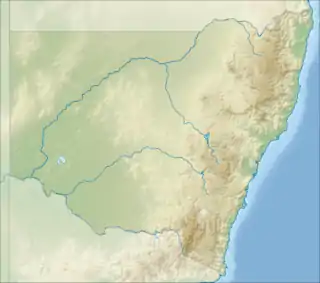Bantry Bay Explosives Depot
The Bantry Bay Explosives Depot is a heritage-listed former explosives depot at Killarney Heights in the Northern Beaches Council, New South Wales, Australia. It was built in 1915. The property is owned by the Office of Environment and Heritage, an agency of the Government of New South Wales. It was added to the New South Wales State Heritage Register on 2 April 1999.[1]
| Bantry Bay Explosives Depot | |
|---|---|
 Location of Bantry Bay Explosives Depot in New South Wales | |
| Location | Killarney Heights, Northern Beaches Council, New South Wales, Australia |
| Coordinates | 33°46′37″S 151°13′49″E |
| Built | 1915– |
| Owner | Office of Environment and Heritage |
| Official name | Bantry Bay Explosives Depot |
| Type | State heritage (complex / group) |
| Designated | 2 April 1999 |
| Reference no. | 977 |
| Type | Ordnance Store |
| Category | Defence |
History
The Bantry Bay Explosives Magazine Complex was established in 1908 following advice from the "Report of the Committee of Inquiry" that explosives stored in Powder Magazines and Hulks in Middle Harbour should be moved to a location less susceptible to explosions.[2] A total of 701 acres and 2 roads were allocated to for the storage facility. Work commenced in 1910 and in 1915 the new magazines at Bantry Bay were declared "Public Magazines".[2] Figure illustrates the location of the Magazine Complex. The Bantry Bay Complex was extremely well designed, with tram tracks linking the recessed nine magazines to the Major Receiving Magazine and jetties on the waterfront.[2] During its time of operation, the complex was a highly specialised and industrious port facility, utilising a variety of boats and specialist hand trolleys to transport goods between the boats and the magazines.[2] The event of new technologies and resident pressure eventuated the official announcement of the closure of the Bantry Bay facility in June 1972. The Complex was closed in May 1974 and incorporated into the Davidson Park State Recreation Area.
In 1992 Davison State Recreation Area was subsequently incorporated into Garigal National Park. Since operations have ceased at Bantry Bay, the care and maintenance of the buildings has been a major problem.[2] Shortly after being included in Garigal National Park, a major stabilisation program was undertaken on the western seawall, but there were insufficient funds to complete the work.[3] Most of the buildings are in relatively sound condition, but have been subject to vandalism, and most of the fittings have been removed.[1][3][4]
Description
The Bantry Bay Explosives Depot is a specialised industrial integrated complex designed for safe handling and cool storage of explosives. The main complex has magazines of different size and light variation in design detail but all with landing platform to tramway in excavated rock, double brick walls, parquet flooring (except fourteen and sixteen) and roofs to lift off under impact of explosion and with in built cooling systems watered from concrete dam. Some wharves are covered to minimise heat exposure. The shed has a door to the Harbour and a pontoon.[1]
Heritage listing
The Bantry Bay Explosives Depot is a unique example of integrated handling and storage facilities for explosive materials.[1]
Bantry Bay Explosives Depot was listed on the New South Wales State Heritage Register on 2 April 1999.[1]
See also
References
- "Bantry Bay Explosives Depot". New South Wales State Heritage Register. Department of Planning & Environment. H00977. Retrieved 2 June 2018.
 Text is licensed by State of New South Wales (Department of Planning and Environment) under CC-BY 4.0 licence.
Text is licensed by State of New South Wales (Department of Planning and Environment) under CC-BY 4.0 licence. - Latona Masterman & Associates, 1982
- NPWS, 1998
- Graham Brooks & Associates; Taylor Brammer landscape Architects; Mary Dallas Consulting Archaeologists. Bantry Bay Conservation Management Plan Draft.
Bibliography
- Attraction Homepage (2007). "Bantry Bay Explosives Depot". Archived from the original on 21 July 2008. Retrieved 18 June 2018.
- Tourism NSW (2007). "Garigal National Park".
- National Parks & Wildlife Service. National Parks & Wildlife Service Section 170 Register.
Attribution
![]() This Wikipedia article was originally based on Bantry Bay Explosives Depot, entry number 00977 in the New South Wales State Heritage Register published by the State of New South Wales (Department of Planning and Environment) 2018 under CC-BY 4.0 licence, accessed on 2 June 2018.
This Wikipedia article was originally based on Bantry Bay Explosives Depot, entry number 00977 in the New South Wales State Heritage Register published by the State of New South Wales (Department of Planning and Environment) 2018 under CC-BY 4.0 licence, accessed on 2 June 2018.